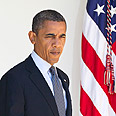
Barack Obama
צילום: AP
Why US won't attack Iran
Op-ed: Americans weary of war in distant countries; changing Democratic Party less supportive of Israel
The violent protests that erupted in the Arab and Islamic world recently serve as a reminder to the US of what may happen should it attack Iran. If this was the reaction to a primitive movie about the prophet Mohammed, how will the Muslims respond to a strike on Iran's nuclear installations? It is safe to assume that in such an event the Sunni-Shia divide won't serve as a moderating factor. Even if Israel launches a go-it-alone attack, the US will be accused at least of assisting the Jewish state – if not of actually taking part in the strike – and will be exposed to more acts of terror.
The Obama administration's fear of a rift with the Muslim world was evident in the numerous conciliatory statements made by the American president during his speech before the UN General Assembly. He dedicated a significant part of his address to lauding the revolutions which swept the Arab world over the past year and stressed Washington's support for the uprisings. At the same time, he addressed the Iranian crisis only briefly.
The US has a number of reasons not to attack Iran. These are some of them:
1. Since the Vietnam War the US has not gone to war without an international coalition, although it has always shouldered most of the burden. This was the case in the Gulf War, the invasions of Iraq and Afghanistan and the campaigns in the former Yugoslavia and in Libya. Obama was criticized for leading the NATO forces' victory in Libya 'from afar,' and some considered this to be his new doctrine. Even during the invasion of the island of Grenada in 1983 President Reagan had a small coalition. Obama will need a much broader coalition of nations to share the military and economic burden of an attack on Iran, but the chances that he will succeed in forming such a coalition for a war that will mostly benefit Israel are slim. In 1967, President Johnson failed to form an international force to break the naval siege of Eilat. Even if Obama does succeed, the process will be long and will not coincide with Netanyahu's timetable.
2. Just like Israel's security establishment, the American security establishment is not interested in a war in Iran at this juncture. The recent statements made by the chairman of the US military's Joint Chiefs of Staff and by the defense secretary have made this abundantly clear. The opposition to an attack stems mainly from the fact that the US armed forces are spread out in a number of countries and are worn out after 10 consecutive years of fighting. The US Army is also fearful of budget cuts that would make it difficult to replenish its arsenal after any campaign against Iran.
3. A sharp rise in the price of oil, which would almost certainly follow any attack on Iran, would severely hurt the US economy. Such a development would hinder Obama's plans to rescue the American economy from the current crisis. The cost of a war on Iran would also increase the US' national debt, which currently tops $16 trillion.
4. While the average American is hostile to the Iranian regime, the majority of the US public has grown weary of war, particularly in distant countries, and is no longer interested in being the 'world's police officer.' Israel's harsh threats have made Iran's nuclear program an Israeli problem, and despite the support for the Jewish state among Conservatives and Evangelicals, recent polls show that 60-70% of Americans are against going to war with Iran.
5. Within the Democratic Party, the traditional pro-Israel consensus between the workers' unions and the liberal camp is dissipating, to some extent due to Israel's policy vis-à-vis the Palestinians. Moreover, many Jewish supporters of the Democratic Party are disgusted by what they view as the domination of religion, racism and nationalism over the Jewish state. The party's character is changing with the addition of many African-Americans and Hispanics, who do not support Israel. The omission of language declaring Jerusalem as the capital of Israel from the Democratic Party's platform is indicative of this trend. Due to demographic changes, if he is reelected Obama will have difficulties waging a war that appears to be an Israeli interest without the support of his party, at the very least. It must also be remembered that Obama believes in diplomatic solutions to international disputes and also seeks reconciliation with the Muslim world.
There is no doubt that Obama wants to stop Iran from building a nuclear bomb, but he has many reasons not to employ military force to achieve this goal. We shouldn't expect Romney to act any different if he is elected president.
Avraham Zilkha is an associate professor of Hebrew and Middle Eastern studies at the University of Texas at Austin










